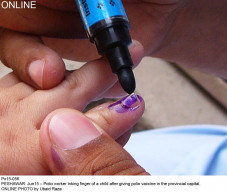
ISLAMABAD: If polio campaigns are successfully managed in Pakistan, Nigeria and Afghanistan, the virus could be eradicated in two years.
Islamic Development Bank (IDB) President Ahmed Mohammad Ali said this on Sunday after the inaugural session of the “International Ulema Conference on Polio Eradication”.
The two-day conference has been organised by the IDB in collaboration with the Ministry of National Health Service, Regulation and Coordination (NHSRC).
About 50 clerics from Pakistan, Saudi Arabia, Egypt and Nigeria and representatives of the International Islamic Fiqh Academy, Al-Azhar University Cairo and King Abdulaziz University Jeddah are attending the conference.
Ali said that the main objective behind organising the conference was to strengthen the ongoing polio eradication initiatives and to clear misconception among those who have certain reservation about polio vaccinations and its adverse effects on their reproductive health.
“The conference will help clerics reach children that had been inaccessible for polio workers since 2012,” he said adding that with the help of the clerics, every child in seminaries, homes and schools in inaccessible areas will be vaccinated.
“Pakistan can easily curb the polio virus by carrying out successful anti-polio drives nationwide,” he said.
Ali expressed concern over travel restrictions slapped on Pakistan by the World Health Organisation (WHO), saying the IDB was not happy with the step and will support Pakistan in overcoming it.
Ali further said that once polio was fully-eradicated, the IDB will look forward to provide assistance to Pakistan for malaria eradication.
Earlier, Health Minister Saira Afzal Tarar said, “The world also needs to understand the problems and challenges being faced by Pakistan in certain areas to make the country polio-free,” she said.
“It is lamentable that we are compared with those who use children for their ulterior motives to gain political mileage by imposing a ban on vaccination of children. By doing this, we are pushing our new generation towards disability for life,” she said.
Tarar regretted, “We have still not been able to bring about behavioural change among those who oppose polio vaccination”.
She hoped that at the end of the conference, religious scholars will be able to issue a joint declaration along with a road map for eradication of polio from the country.
Meanwhile, Pakistan Ulema Council head Tahir Ashrafi expressed grave concern over the absence of government representatives.
“The prime minister should take note of the absence of a government representative at this very important session,” he said.
He also expressed solidarity with media persons who were not allowed to attend the conference. “By doing this, the government was trying to hide the reality. They should have allowed the media to cover the entire conference,” he said.
He also expressed displeasure with the association of polio with the Federally Administered Tribal Areas and Khyber-Pakhtunkhwa. “This is the issue for the whole of Pakistan and not one province. The virus is present in many other big cities as well,” he said.
Published in The Express Tribune, June 16th, 2014.






















































COMMENTS
Comments are moderated and generally will be posted if they are on-topic and not abusive.
For more information, please see our Comments FAQ